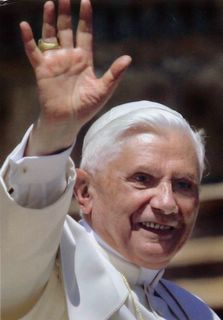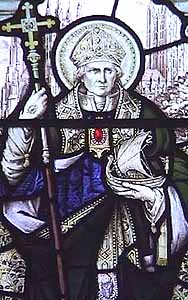A Sermon for the 11th Sunday after Pentecost
“Jesus said, ‘They need not go away. You give them something to eat.’” From the Gospel according to St. Matthew, in the name of the Father, and of the Son, and of the Holy Spirit. Amen.
Every year around Easter or Christmas you are bound to see it on the convenience store news rack—a cover article in Time or Newsweek about the REAL Jesus. These magazines promise to debunk the “Sunday school version” of Christ by revealing the “Jesus of history” as reconstructed by modern scholars. These issues are usually among the year’s best-selling. Clearly many Americans suspect that what they’ve been told about Jesus from the pulpit isn’t the full story. After all, didn’t the Church cover up the Gnostic gospels for centuries? Doesn’t the Vatican have a “Secret Archive”? Let’s face it: The DaVinci Code struck a chord with a lot of Americans. It is not surprising that millions of readers want to learn what “unbiased” experts have to say about Jesus of Nazareth.
Unfortunately, much of what Hollywood and the news media tell the American people about the “Jesus of history” is a far cry from objective fact. In truth, many of the scholars who do “historical Jesus” research are deeply hostile to traditional Christianity. Some of today’s most popular books on the subject were intentionally written to undermine and reconstruct the religious beliefs of their readers. Their authors hope to replace the Christ proclaimed by the Church with an alternative Jesus that better reflects their own “enlightened,” “humane,” or “progressive” values. The result is a new and improved American Jesus, custom designed to guide our quest for personal fulfillment: Oprah, Dr. Phil and Deepak Chopra all rolled into one.
Of course, this newly-fabricated Jesus still bears some resemblance to the Christ of the New Testament. Like the Biblical Jesus, the Jesus of Time and Newsweek calls us to social justice, reassures us when we are anxious and urges us to reach out to the despised and the lowly. But this “revised” Jesus no longer strains our intellects with claims of divinity or challenges our preconceptions by working real miracles. We no longer have to believe Jesus fed multitudes with the contents of a child’s lunchbox, that he calmed a stormy sea, or raised the dead, or walked out of his tomb on Easter morning.
The hypothetical Jesus created by modern scholars is chiefly a moral teacher and social activist. He might inspire us to become better people, but he will never claim to be our “savior.” I suspect this is his most attractive quality for many people. After all, we Americans are an independent bunch. We want to meet Jesus on our own terms. We like being spiritually and morally challenged, but not too much. We appreciate some help along the path to salvation—whatever “salvation” might be—but in the end we want to do the “saving” ourselves. It is no coincidence that this new Jesus--an all-inclusive, non-judgmental, wandering Jewish wise man—perfectly meets the demands of today’s “spirituality” marketplace. I am reminded of what Aaron said when Moses caught the Israelites with the golden calf: “The people gave their gold to me, and I threw it into the fire, and out came this calf!”
Make no mistake about it: this “new model Jesus” is an idol of our own devising. Although he bears a superficial resemblance to the Lord of all creation, this manufactured Jesus is as hollow and perishable as Aaron’s golden calf. Every generation or two intellectuals who want to remake Christianity have to retool and come out with a new version of their hero. The Christ of the Bible is “the same, yesterday, today and forever,” but it seems American culture prefers a Jesus who comes with periodic “upgrades.” We are eager to download “Jesus 2.0.”
I will admit that I sometimes despair at the misinformation about our Lord and our Faith that circulates today. We all know people whose souls are starving for lack of knowledge of our Lord. But how can we share the good news about Jesus—the Jesus of the Bible, the Jesus of the Church, the Jesus who saves from sin and death—when so many people think they have already learned the truth about Him from a bestselling novel or a PBS documentary? It is difficult not become discouraged. But take a look at today’s Old Testament lesson. Listen to what Ezra prays: “Thou art a God ready to forgive, gracious and merciful, slow to anger and abounding in steadfast love, and didst not forsake them. Even when they had made for themselves a molten calf … and had committed great blasphemies, thou in thy great mercies did not forsake them in the wilderness.” It is certainly true that many sincere people have been tricked into following a false Jesus. Millions today bow down today before a man-made image. Yet the God who rained down manna even upon the disobedient children of Israel will not forsake the lost of our own time. He will provide for them food enough.
The crowds that gathered around our Lord as he taught in the villages and countryside of Palestine didn’t have the faintest idea who He really was. No doubt they each projected their hopes and dreams onto him as surely as our contemporaries do today. Even his closest disciples didn’t truly understand Him until they had experienced His Passion and His Resurrection. Yet Christ never turned away those who sought Him. In compassion Jesus even looked after their physical needs, as he does in our Gospel lesson today. But the miraculous feeding of the 5000 was a mere shadow of what was to come. Shortly after this miracle, Jesus told the crowd that the true food and true drink he offers are His precious Flesh and Blood. He promised that those who partake of this holy food will abide in Him for eternal life. The real Jesus wants to give Himself to us, forging a bond so complete that “nothing, neither death nor life … neither things present nor things to come … nor anything in all creation, will be able to separate us from the love of God we have in Christ Jesus our Lord.”
In a few moments God incarnate will share His divine life with us at this altar. You and I will taste the only true food and drink one can experience in this life. Yet there are millions of our fellow Americans who are spiritually starving and do not know it. They think they know Jesus because they have read some second-rate scholarship or watched a cable news special. In fact what they have received is a Styrofoam Jesus. He is not the only-begotten Son of the Father. He is not the one who died on the cross for us and rose again, trampling down death by his own death. Spiritual life cannot be nourished by a bloodless, simulated Jesus. The real Jesus yearns to feed these lost sheep. But how is he going to do that when the sheep don’t realize they need to be feed?
Christ tells us the same thing He told those disciples long ago: “You give them something to eat.” You and I—the people of St. Vincent’s Cathedral Church—are called to take “the living bread that came down from heaven” to those who need it. That is a serious responsibility. I don’t know about you, but I find this a very daunting assignment. Just look at all the lies and distortions and ignorance that pass for “enlightened opinion” these days. I’m just one man in suburban Texas. How much difference can one person really make?
Our Lord Jesus simply points to the five loaves and the two fish. Through Christ’s power his first disciples used a trivial amount of earthly food to satisfy the hunger of thousands. The Lord imparts that same divine power to his Church today, so we can offer millions the food that leads to eternal life. Fortunately, you and I can start small and we won’t have to go very far. I am certain that everyone here knows somebody whose soul is starving to know what we can tell them about our Lord and Savior. These people may not yet realize what they are hungering for, but that is what they need. Their hearts will never be truly satisfied until the Styrofoam Jesus our culture offers them is replaced by the real, flesh and blood Redeemer. Of course, sharing the Good News is not always easy, and some people aren’t going to like what we have got to say. But if you have ever seen a soul come to life again after being nourished by the knowledge and love of God, then you know this is worth doing. That is what happens when mortals eat the bread of angels, and it is a thing of beauty. I do not know if there will be twelve basketsful left over when every man, woman and child on earth has feasted on Christ, but let’s do whatever we can to find out. May God give us the grace to carry the real Jesus out into the world until all have tasted of his goodness and are satisfied. Amen.













